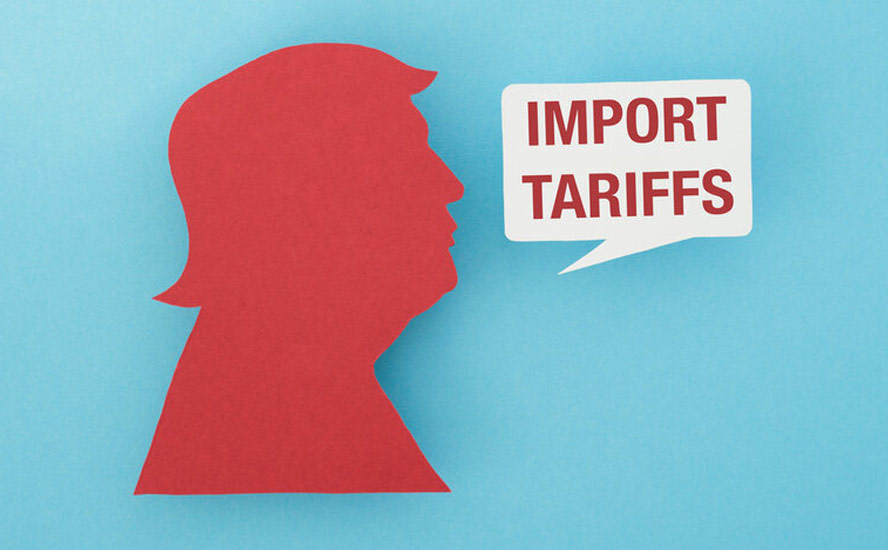In Washington, the clowns are running the circus

2020.01.29
Gold climbed to a seven-year high on Monday, as fears over the spread of the corona virus had investors clambering for less risky assets than stocks.
While it has so far been mostly confined to China, markets are alarmed by the possibility of the virus spreading to other countries, and causing a global pandemic that could impede economic growth. It has reportedly spread to 10 other countries, with five cases confirmed in the US and one in Canada.
Spot gold closed Jan. 27 at $1,581 an ounce at the Comex in New York, its best performance since the 9th of April, 2013. Gold for February delivery (gold futures) jumped just over $9 to $1,587 on Monday afternoon, before settling back a buck, as of this writing, Tuesday.
Considering all that is going on in the world, is it any wonder the yellow metal is already up 3% year to date (about $51), and we’re not even through January?
The Trump impeachment trial in the Senate is being run like a reality television show, with all the political partisanship that has come to define America seemingly used as fodder for TV ratings. The brash president pulled troops out of Syria, leaving a key US ally that was fighting ISIS, the Kurds, at the mercy of the murderous Syrian and Turkey regimes. Despite what Trump says, the war against ISIS isn’t over, we can’t even get collaboration between the Democrats and Republicans on a plan to fix the critical metals shortage. It also appears that North Korea, despite Trump’s bold attempt to negotiate “mano a mano” with the hermit kingdom’s erratic leader, is apparently gearing up for another missile test to prove its capability of destroying cities on the US mainland.
As Trump’s defense team wrapped up its opening argument on Tuesday – the second day of Trump’s Senate impeachment trial – a vote looms over whether to call witnesses.
If witnesses including Trump’s former national security adviser, John Bolton, are asked to testify, they could supply evidence that supports the House Democrats’ case for impeachment. The crux is the allegation that Trump withheld military aid to Ukraine, in order to pressure Ukraine to investigate Democrat Joe Biden and his son Hunter, who served on the board of a Ukrainian energy company while his father was vice president.
Trump’s lawyers counter that the president was justified in asking for an investigation, because of a history of corruption involving the company. Trump himself has vehemently denied that he ever issued a “quid pro quo” to Ukraine’s president, Volodymyr Zelensky, that military aid, and a White House visit, would be forthcoming only if Zelensky launched a probe into the Bidens.
But details of a July 25, 2019 phone conversation between Zelensky and Trump, who called the incoming president to congratulate him on his election victory, cast aspersions on Trump’s and the Republicans’ claims of innocence in the matter.
First, the call came only a few days after Trump blocked $391 million in military aid to Ukraine, a strategically important US ally whose geopolitical position straddles Europe and Russia. The United States was quick to recognize the country of 40 million’s independence from its former Soviet overlords in 1991. In 2014 Russia backed an insurgency in eastern Ukraine, and Moscow annexed the Crimean peninsula from Ukraine after a widely denounced referendum, thought to be fixed. The ongoing war in the region has killed over 13,000 people.
Second, an anonymous whistleblower reported to be a CIA official felt there was more to the July 25 call than congratulations, and registered a formal complaint on Aug. 12. Accounts of the call shared by various officials who listened in, including Secretary of State Mike Pompeo, paint a consistent picture of a deal being struck between Trump and Zelensky.
The whistleblower alleged that Trump used “the power of his office to solicit interference from a foreign country” in the 2020 presidential election – an impeachable offense. At first the president promised to release a fully declassified, unredacted transcript of the phone call, but instead, the White House only disclosed notes of the conversation.
The notes show Trump urged Zelensky to investigate corruption allegations against Hunter Biden and Joe Biden, who is the Democratic front-runner in the upcoming election. While Trump and his allies suggest Joe Biden encouraged the firing of Ukraine’s top prosecutor in 2105 because the individual had been probing the Ukrainian energy company where Hunter worked, officials in Kiev have said there is no evidence to support the allegations, the BBC reported. Evidence is also lacking that Biden did anything to intentionally help his son, which would have been a conflict of interest.
These details were enough for Democratic leaders in the House of Representatives to levy two impeachment charges against Trump – abuse of power and obstruction of Congress. A week before Christmas the Democrat-controlled House voted to impeach Trump, making him the third US president, along with Andrew Johnson and Bill Clinton, to suffer the same fate.
But removing Trump from office requires a Senate trial and two-thirds majority to convict, which everyone knows is unlikely to occur given that the Republicans are the majority in the Senate.
That brings us to the trial, which as mentioned, has become a jarring example of political partisanship at the extreme, in a democratically elected body that is supposed to be the arbiter of diverse opinion and a chamber of sober reflection on legislation that comes before it.
A fair trial should involve witnesses, giving testimony for or against the allegations, but so far, none has been allowed to come forward, despite several key officials known to have information that could bring down the president.
For example, the US government’s special envoy to the Ukraine, Kurt Volker, apparently turned over a trove of text messages and other communications to the Democrats’ formal inquiry into the Ukraine affair. Should these texts not be read as evidence at the impeachment trial?
Trump’s personal lawyer and former New York Mayor Rudy Guiliani, and Sec. of State Pompeo, have both been subpoenaed for documents relating to Ukraine. Gordon Sondland, the US ambassador to the EU, reportedly told Congress he was working at the “express direction” of the president when Ukraine was being pressured to investigate the Bidens. Sondland also implicated John Bolton, Trump’s former national security adviser, and Mike Pompeo in the Ukraine dealings.
Acting Ambassador to the Ukraine, Bill Taylor, affirmed the accusation of a quid pro quo by telling the inquiry that Trump made the release of of military aid conditional on Ukraine probing the Biden’s dealings.
But the most damning testimony, should he be subpoenaed, would come from Bolton who is writing a book about his tenure as national security adviser. On Sunday, the New York Times reported a critical section of an unpublished draft manuscript of the book. The section, supposedly leaked by an anon government official has Trump telling Bolton he wanted to continue withholding military aid until Ukraine helped with investigations into the Bidens. If Bolton’s testimony affirms what he writes in his book, it would directly tie US military aid to a presidential request for Ukraine to investigate his political rival, and undermine Trump’s impeachment defense that the two events were unrelated.
A vote on whether to proceed to consider witnesses and documents is likely to happen on Friday or Saturday.
Presently all but two Senate Republicans – Mitt Romney of Utah and Susan Collins of Maine – “are, for now, in line with preferred path of the White House and GOP leadership to defeat a witness vote and bring the trial to a close,” according to a media report Tuesday.
The clam-up among Republicans who “know too much” makes a mockery of this trial which is supposed to be about Trump’s, at best, unethical, at worst, illegal dealings with a foreign leader done not to benefit the country but himself and his re-election chances.
During the trial on Monday, as Trump’s legal team tried to shift the blame to Biden, one of his attorneys said the damaging content of Bolton’s manuscript should be ignored, “because it’s not in evidence.” Well excuse me, but this is the president’s former national security adviser! If anyone can shed light on what was behind Trump and Zelensky’s conversation, it’s Bolton, who should, of course, be called to testify. He doesn’t even need to prepare testimony. All he has to do is read from his book!
Another key part of Trump’s impeachment defense is that the president wasn’t doing anything to help boost his election chances, he was only trying to root out corruption in the Ukraine. Well, on Monday night, Republican Joni Ernst exposed that as a lie too. After Trump’s lawyers tried to make the case that Biden, without any evidence, acted inappropriately in asking the country’s top prosecutor to resign, Ernst told reporters:
“Iowa caucuses are this next Monday evening. And I’m really interested to see how this discussion today informs and influences the Iowa caucus voters, those Democratic caucus goers. Will they be supporting VP Biden at this point?”
So, even though Trump’s supporters, including Ernst, have for months argued that Trump’s effort to get the Ukrainian president to look into the Bidens has nothing to do with Biden running for the 2020 Democratic nomination (it’s all about rooting out corruption) here is Ernst saying she hopes the focus on Biden at the impeachment trial will change the minds of Iowa Democrats when they caucus next Monday.
Trump of course isn’t the only one lying and actively trying to suppress evidence about what happened in the Ukraine.
According to a New York Times story, on Monday Senate Majority Leader Mitch McConnell was “angry at having been blindsided by the White House about Mr. Bolton’s manuscript”. Was he really, or just appearing to be? Although McConnell put out a statement saying he did not have any advance notice of Bolton’s account, his manuscript has been available to White House aides since December.
Mike Pompeo has also been called out for trying to censor facts relating to the impeachment trial. Recently the State Department, led by Pompeo, removed an NPR reporter from the press pool scheduled for an upcoming foreign trip, without explanation.
Trump often picks and chooses who he considers “real news” (supporting his agenda) and “fake news” (media outlets who disagree with him). Most will recall his incendiary tweet in May describing the press, in all-caps, as “THE ENEMY OF THE PEOPLE”.
The BBC explains the slight against reporter Mary Louise Kelly is thought to be retaliation against her earlier interview with Pompeo, where she repeatedly questioned Pompeo about Marie Yovanovitch, who was ousted as US Ambassador to the Ukraine.
Trump is also tied to that decision. In a 2018 taped conversation, Trump is heard demanding the ambassador’s removal. Time writes that Trump wanted Yovanovitch gone because she was viewed as disloyal to the president and an obstacle to the desired investigation of Biden and his son. A year later her ouster emerged as an issue in the impeachment hearings. Also heard on the tape was Lev Parnas, an associate of Rudy Guiliani, and Igor Fruman – both of whom were indicted by the Southern District of New York on charges including conspiracy to commit campaign finance fraud. Both have pleaded not guilty, according to Time.
All of these events are detailed in this piece to show the dysfunctional polarity of views that has become the norm in US politics. We have written before on how this extreme polarization is killing America.
The real disaster is the fact that partisanship is preventing legislators from working together to solve important issues – like addressing the ways that climate change is set to wreck US coastal cities, or reforming mining legislation to make America less dependent on foreign suppliers of critical minerals.
On the Republican side of climate change we have the Trump administration gutting the EPA, slashing government funding and tax credits for renewable energy, and revoking California’s right to set stricter vehicle emission standards than the federal government. The Democratic response is the ridiculously unworkable Green New Deal – a 14-page manifesto of climate change-related spending costing up to $1 trillion.
We’ve noticed the partisanship, the bickering, the impasses, the sheer hatred of the other side, is worse under Trump, who certainly fanned the flames of discord to get elected, and continues to blow on them, knowing that divide and conquer is his best path to re-election in 2020.
Things aren’t much better with the Democratic Party, though. When House Democrats endorsed the two articles of impeachment against Trump, Speaker Nancy Pelosi handed out pens. Yep, souvenir pens, emblazoned with Pelosi’s golden signature, literally on a silver platter. Mitch McConnell called it “the House’s partisan process distilled into one last perfect visual. Not solemn or serious. A transparently political exercise from beginning to end.” He’s right. The Democrats were supposed to be the adult in the room. Instead they’re acting like a bunch of fifth graders at a school assembly.
Non-partisan gold
Amid the uncertainty over whether Trump will be impeached, the trial that is exposing the politicians for what they are – a bunch of liars and cheats who will say anything or do anything, including burying/ obstructing key evidence, to get re-elected – the trade war that still hasn’t been resolved, Trump’s foreign policy blunders like withdrawing some Syria, ordering the assassination of an Iranian general, Iran resuming its nuclear program, North Korea testing more ICBMs, you have gold, unsurprisingly, continuing to gain strength.
When you think about it, gold is the one thing that isn’t partisan, in our extremely partisan world. You can trust gold.
Rich or poor, black or white, gay or straight, young and old, Democrat or Republican, it doesn’t matter to gold. People buy bullion because they trust it as something tangible, something of real value, that will continue to be there for them no matter how badly the assclowns running the circus called Washington are screwing things up.
Gold is affordable and accessible to the average citizen. Silver even more so, being that much cheaper and right now, undervalued compared to gold at about 86:1 (86 oz of silver buys 1 oz of gold) versus the historical average of 56:1.
Richard (Rick) Mills
subscribe to my free newsletter
aheadoftheherd.com
Ahead of the Herd Twitter
Legal Notice / Disclaimer
Ahead of the Herd newsletter, aheadoftheherd.com, hereafter known as AOTH.
Please read the entire Disclaimer carefully before you use this website or read the newsletter. If you do not agree to all the AOTH/Richard Mills Disclaimer, do not access/read this website/newsletter/article, or any of its pages. By reading/using this AOTH/Richard Mills website/newsletter/article, and whether or not you actually read this Disclaimer, you are deemed to have accepted it.
Any AOTH/Richard Mills document is not, and should not be, construed as an offer to sell or the solicitation of an offer to purchase or subscribe for any investment.
AOTH/Richard Mills has based this document on information obtained from sources he believes to be reliable but which has not been independently verified. AOTH/Richard Mills makes no guarantee, representation or warranty and accepts no responsibility or liability as to its accuracy or completeness. Expressions of opinion are those of AOTH/Richard Mills only and are subject to change without notice. AOTH/Richard Mills assumes no warranty, liability or guarantee for the current relevance, correctness or completeness of any information provided within this Report and will not be held liable for the consequence of reliance upon any opinion or statement contained herein or any omission. Furthermore, AOTH/Richard Mills assumes no liability for any direct or indirect loss or damage or, in particular, for lost profit, which you may incur as a result of the use and existence of the information provided within this AOTH/Richard Mills Report.
AOTH/Richard Mills is not a registered broker/financial advisor and does not hold any licenses. These are solely personal thoughts and opinions about finance and/or investments – no information posted on this site is to be considered investment advice or a recommendation to do anything involving finance or money aside from performing your own due diligence and consulting with your personal registered broker/financial advisor. You agree that by reading AOTH/Richard Mills articles, you are acting at your OWN RISK. In no event should AOTH/Richard Mills liable for any direct or indirect trading losses caused by any information contained in AOTH/Richard Mills articles. Information in AOTH/Richard Mills articles is not an offer to sell or a solicitation of an offer to buy any security. AOTH/Richard Mills is not suggesting the transacting of any financial instruments but does suggest consulting your own registered broker/financial advisor with regards to any such transactions
Legal Notice / Disclaimer
Ahead of the Herd newsletter, aheadoftheherd.com, hereafter known as AOTH.Please read the entire Disclaimer carefully before you use this website or read the newsletter. If you do not agree to all the AOTH/Richard Mills Disclaimer, do not access/read this website/newsletter/article, or any of its pages. By reading/using this AOTH/Richard Mills website/newsletter/article, and whether you actually read this Disclaimer, you are deemed to have accepted it.


























